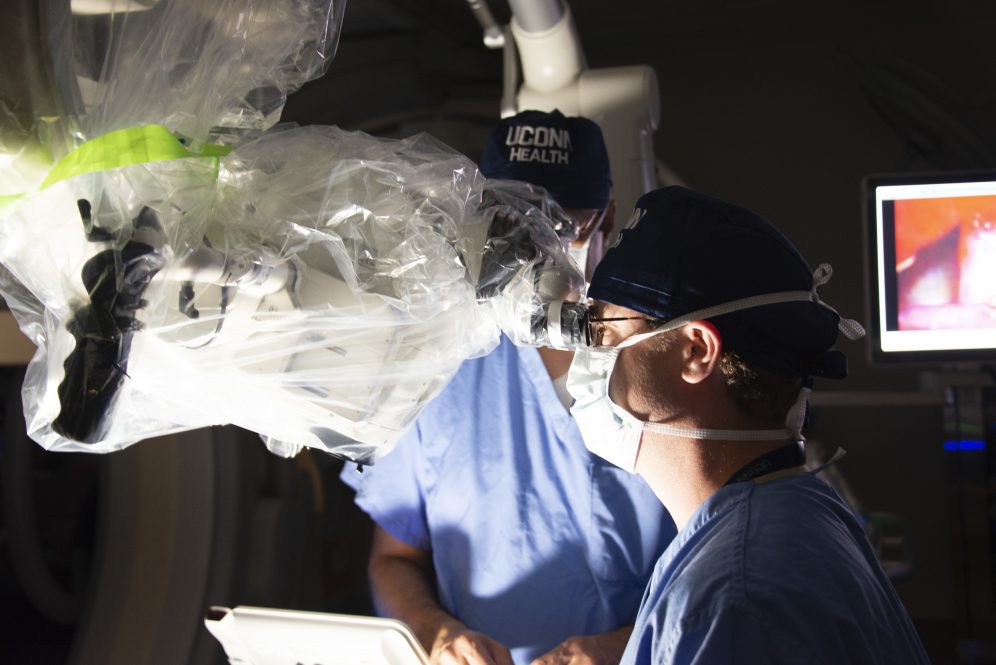It was a snowy February day as Linda Kaye went through her daily routine of making the bed when she fell. At first, she thought that she tripped over a pillow on the floor, as she tried to get up she realized her right leg wouldn’t move. Trying to get her right hand to lift the leg, it too wouldn’t work. She knew she was having a stroke.
Calling to her husband who was downstairs, her words were garbled, but he understood her to say the word “stroke” and called 911.
She remembers not feeling pain or nervousness at all and the EMTs told her they would be taking her to the Stroke Center at UConn Health in Farmington, she couldn’t talk but she was aware.
Upon arriving at the Emergency Department at UConn John Dempsey Hospital, the stroke team was ready and she was taken for a CT Scan. UConn Health has advanced CT perfusion imaging, an advanced imaging, not all other hospitals have, which showed she was having an acute ischemic stroke.
Acute ischemic stroke is the sudden loss of blood flow to an area of the brain with the resulting loss of neurologic function. It is caused by thrombosis or embolism that blocks a cerebral vessel supplying a specific area of the brain.
Kaye was given tissue Plasminogen Activator (tPA). When administered quickly after stroke onset, tPA helps to restore blood flow to brain regions affected by a stroke, thereby limiting the risk of damage and functional impairment.
More than 90% of patients at UConn Health will get the clot-reducing medication within 60 minutes or less.
The neurologists, neuro-interventionalists, anesthesiologists, and neurosurgeons in the hospital’s state-of-the-art hybrid OR room and its OR staff worked quickly to get Kaye an immediate mechanical thrombectomy procedure to remove the stroke from traveling deeper into her brain.
After her surgery, Kaye was admitted to the ICU and had an almost complete resolution of her stroke symptoms with few deficits.
“The management of stroke patients is a multidisciplinary team effort. Immediate treatment is essential because, with every second that goes by, there is potentially less brain tissue that can be saved,” says Ketan Bulsara, professor, and chief, Division of Neurosurgery.
“I remember waking up and saying ‘thank God I can talk’ to Dr. Bulsara,” says Kaye. “Everything was working.
The hardest part of being in the hospital at this time was not being able to have visitors due to the COVID-19 restrictions. Both her husband and son are radiologists and she would have liked them by her side.
“The nurses were so great, knowing how hard it was to not have visitors, they came and sat with me and talked to me to keep me company,” says Kaye.
At UConn Health, the Stroke Center the team is trained in the latest procedures and technology, ensuring patients receive a rapid response and coordinated care for stroke recovery.
“I came out a whole person and I’m grateful,” says Kaye.
May is Stroke Awareness Month
Know the warning signs and symptoms of stroke so that you can act fast if you or someone you know might be having a stroke. The chances of survival are greater when emergency treatment begins quickly.
Time is Brain – BEFAST
B – BALANCE – watch for sudden loss of balance.
E – EYES – check for vision loss
F – FACE – Does one side of the face droop or is it numb? Is the smile uneven?
A-ARM – is one arm week or numb
S – SPEECH – is speech slurred? Unable to speak or hard to understand?
T – TIME – if someone shows any of these symptoms, even if the symptoms go away, call 9-1-1 and get the person to the hospital immediately. Check the time so you know when symptoms first appeared.
Seek emergency care when you need it. UConn Health’s Emergency Department and its dedicated Stroke Center team are ready 24/7 to help you safely and promptly.



